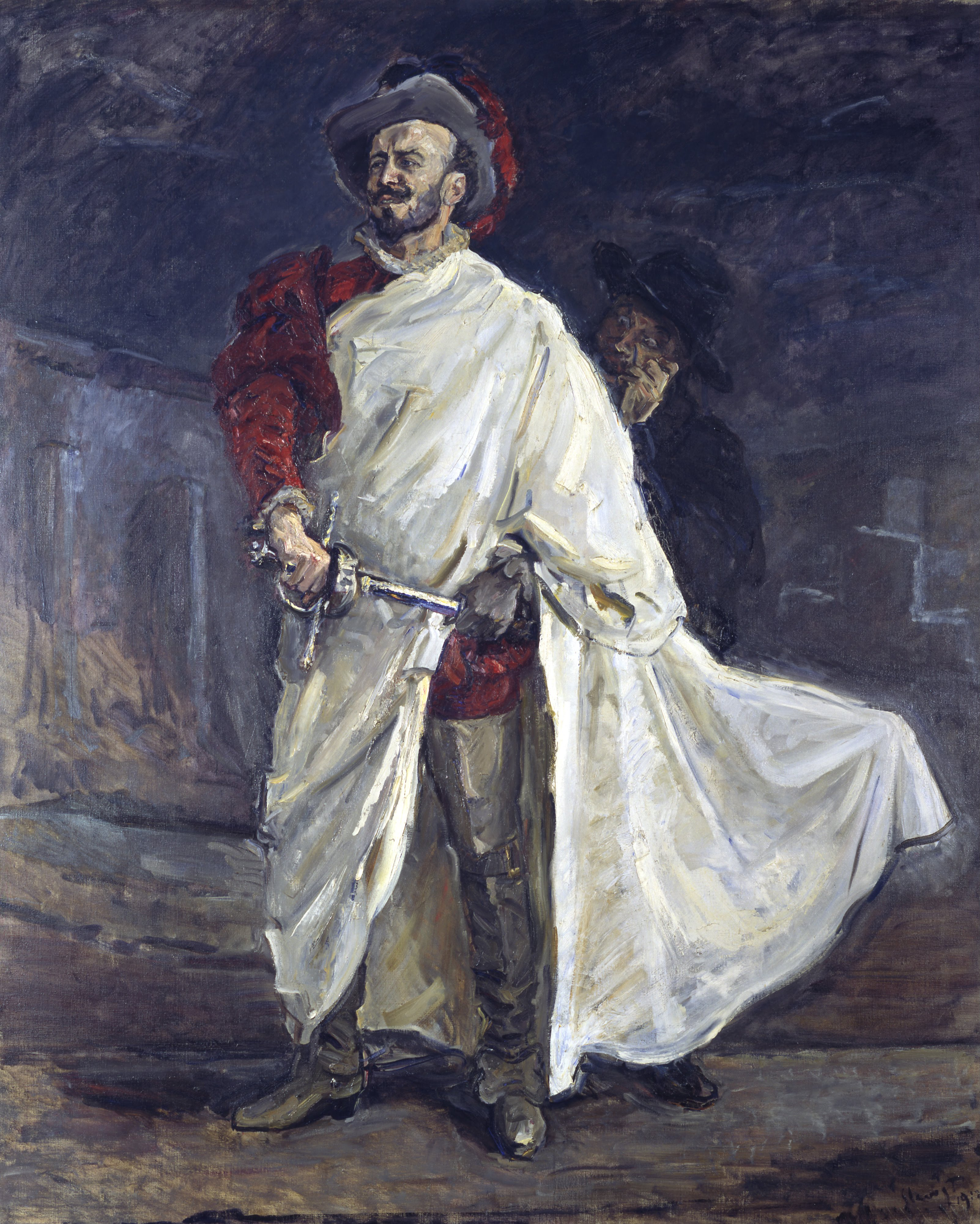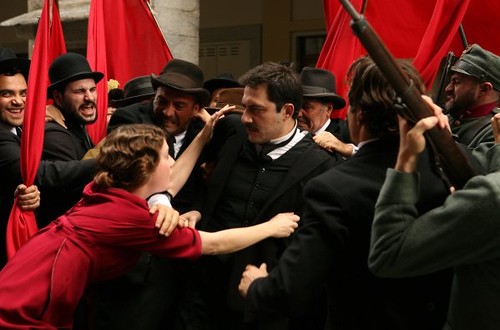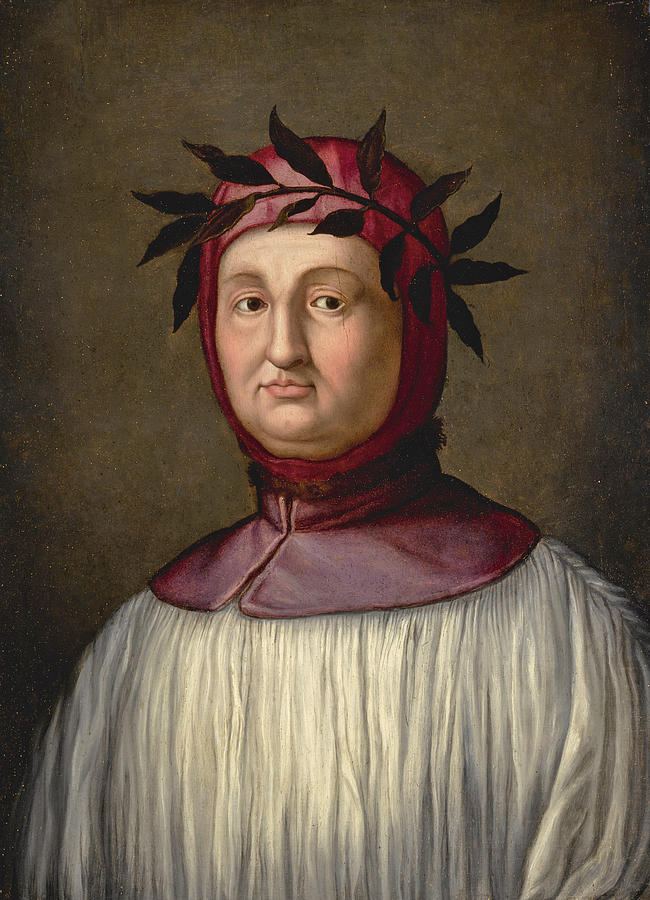Kierkegaard, "Don Giovanni" (part 2)
 Tuesday, January 31, 2012 at 16:21
Tuesday, January 31, 2012 at 16:21 The conclusion of a review by this Danish philosopher of an 1843 performance of this work of art. You can read the original here.

 Let a couple of years pass by then go and visit Mr. Masetto: you will find Zerlina essentially unchanged. As she goes along and plays with him in the opera, so now she – pretty, beloved, etc. – is pottering about his house. Were you to say to her, "But how was it then with that Don Giovanni fellow?" she would answer: "Yes, it was odd, it was an odd wedding day, such a hullabaloo, and I had to be on the lookout everywhere I went: suddenly Masetto would appear, grousing, suddenly Don Giovanni, who wanted to speak with me. I firmly believe that if it hadn't been for me, they would have killed each other." So must she remain in order to make herself a female character distinct from Anna and Elvira. Comparatively, Anna is far less culpable than Zerlina. She has confused Giovanni with Ottavio, nothing more. But because she is considerably developed, this may end up troubling her for the rest of her life. This she fails to disclose for as long as possible, and becomes crazed with the idea of vengeance.
Let a couple of years pass by then go and visit Mr. Masetto: you will find Zerlina essentially unchanged. As she goes along and plays with him in the opera, so now she – pretty, beloved, etc. – is pottering about his house. Were you to say to her, "But how was it then with that Don Giovanni fellow?" she would answer: "Yes, it was odd, it was an odd wedding day, such a hullabaloo, and I had to be on the lookout everywhere I went: suddenly Masetto would appear, grousing, suddenly Don Giovanni, who wanted to speak with me. I firmly believe that if it hadn't been for me, they would have killed each other." So must she remain in order to make herself a female character distinct from Anna and Elvira. Comparatively, Anna is far less culpable than Zerlina. She has confused Giovanni with Ottavio, nothing more. But because she is considerably developed, this may end up troubling her for the rest of her life. This she fails to disclose for as long as possible, and becomes crazed with the idea of vengeance.
Yet Zerlina remains undaunted and proceeds, in carefree fashion, both to a dance with Don Giovanni and confession at Masetto's, which is altogether somewhat remarkable, and each of these gentlemen in due time will become stakeholders. She is abroad in all parts and feels herself to be in the same circle of society as those noble ladies and just as important as any of them. She is about to reel in Don Giovanni, not because he has seduced her, but because he has killed Masetto (it is significant that she confounds the physical and the moral), and therefore finds that Leporello is just as culpable, because he too has killed Masetto, her own little Masetto of whom she is so fond, and towards whom everyone else is rather nasty.
Elvira is a vast female character with an absolute passion to know and understand what it means to be seduced. She does not wish to save a modicum of her honor from the world, she wishes to stop Don Giovanni, naturally with the reservation that he wants to be true to her. So she forsakes the mission's itinerant component – but in this way the mission likewise is stopped. This is genuinely feminine, an exquisite invention. Yet in a way, on her mission as a woman she is out of her depths, außer sich, and therefore there must fall upon her a comic light. I am not thinking of her deeply tragic situation in the second act where she mistakes Leporello for Don Giovanni, about whom one writer has said that this is almost cruel, if for another reason. She herself is seduced, and now she wishes to rescue others, without thinking that for such an endeavor one needs preliminary studies and numerous exams, whereby one might acquire the ability to take on others. This she cannot do at all. Nor, therefore, can she make herself understood to Zerlina, and in this respect Elvira remains a comic figure. She transfers all her pathos to Zerlina and in the end, am Ende, Zerlina can better understand Don Giovanni than comprehend Elvira. Thus an actress portraying Zerlina should not, as used to be done in this work, become appalled or seized by fear from Elvira's talk – that would be far too much. She ought to marvel at this new surprise, and marvel that the good listener and viewer will almost smile upon the situation, while still detecting the tragic element in Elvira.
Now to Don Giovanni. If the singer were to imbue his voice with imagination and use this performance for such an accompaniment, what then? The situation would become a seduction scene; perhaps, but not in an opera. On the other hand, in a drama where a seducer does not sing to the girl but for the girl, so by this method he can help out in terms of imagination. I shall outline precisely such a scenario. There would be no farm girl, but a lady, a Donna, a developed girl with considerable qualifications. The seducer has the voice, he knows how to let his imagination infect it. So sometimes he sings for her what she would like to hear. And then one day – as is to be understood, coincidentally – he selects the performance as Don Juan. This he performs with complete imagination and inspiration. Naturally, he does not look at her, not a glance, not a desire, otherwise all would be lost. He looks straight in front of him and his voice begins to rise and brighten as he sets the mood for the imaginary allurement and seduction. So the Donna listens, safe and comfortable as she is, because she knows that he is not singing to her, that this is not about her, and this is where she gives in to daydreams. And when these dreams are assumed to have taken effect, here is where the seducer procures the first rendezvous both in his imagination and in the imagination's view and the weakened notion of the face-to-face meeting. Should this be portrayed, this would in essence no longer be an opera, but its transition from this situation to the seduction's reality as reflected in a drama or tale.
Now if Mr. Hansen were to be assigned this situation in a drama, then his performance would be the definitive version, the omnibus numeris absoluta, and every person who has a sense for such observations would certainly not deny that it is stunning to hear such a superb performance. Calm and insinuating in his voice, wistful and dreamy yet clear in his expression, articulating every letter so that nothing is wasted and no time is lost, he engenders a rare effect. But when it is in an opera, as in this case, the battle must be fought, and this sensational performance would not be in the right place, a golden apple in a silver bowl. Don Giovanni is no pampered sitar player, but rather a seducer who has a need for such a mask at first approach. Were one to take another moment in the opera, the guitar aria, for example, or Don Giovanni's aria as worked into Elvira's first part, "Poverina, poverina," then dwelling on this last point, I would say that here the performance could be put to use. Nothing essential of what is Don Giovanni concerns this outburst, Don Giovanni who remains in a way based upon himself and in constant anticipation of pleasure. For that reason should the voice be imbued with imagination, an ironic tinge should not arise in Don Giovanni's rumination about this relationship, although this will be precisely the impression made on the listener and viewer who understands Don Giovanni. The actor must then also be sure to remain at peace until this moment, when the contrary then becomes correct and during the aria he will go back and forth in a certain tension. But most of all he may not emerge when he sings these words, because Elvira won't hear them anyway. Nor should he sing them to Leporello as the remaining part of the aria. The essential here is that Don Giovanni is in the mood. The unique effect in this situation should not result in reflections or assessments by Don Giovanni, but in the search for the total effect, which one writer has demonstrated.
In the duet with Zerlina, Don Giovanni sings to Zerlina. This is Don Giovanni, and Zerlina is the adorable little farm girl. Compared to the Donna in the hypothetical situation outlined above, it was necessary to begin in such a manner because the attraction was not immediate. For that reason it all began as innocent reverie and this holds true for the entire seduction: one moment of premature passion and all would be lost. Just because Zerlina is now a farm girl, it does not follow that Don Giovanni ought to begin with rascally mischief; Don Giovanni never does that. Naturally, with natural power and no posing or study, Don Giovanni always has a certain dignity and grace. Even the recitations before the duet are flavorful in the good sense. This is completely correct because Don Giovanni is a man who acts without reflection. And to understand a farm girl on such a broad plain of the imagination and in an idealizing surtout when one, like Don Giovanni, is certain that she is in the process of seeing and admiring this handsome man, is a superb method of making her dazed in the head. A fellow quick to his fists would be understood all too rapidly by Zerlina and would put her on her guard, since in all her naïveté Zerlina is honorable and does not understand jokes. And she does not at all understand the man she sees. At the same time, however, one may see Don Giovanni's haughtiness here as an important commentary on the text, see him catch flies with candy, see how he in a certain sense is right when he says to Elvira: "that was only in jest." This replique is neither vicious nor ironic, but forthcoming and direct. Don Giovanni considers Elvira to be too powerful to be affected by a little fling with little Zerlina; she the seduced par excellence, ϰατ' ἐξοχην, and Zerlina! It is still easy to allow Don Giovanni some reflection, and in the opera the art is precisely in keeping this tendency at bay, for a Don Giovanni without the slightest reflection would be a meager figure and the opera would fail in its construction. The actor must embody haughtiness in his posture, his expressions, his gestures, his presentations, in all his figure's finality.
Then the duet begins. One feels that one hears the accompaniment's dreamy plainness (owing to the fact that music is a universal medium) in Don Giovanni's application of his charms in which he seizes Zerlina, in his and the accompaniment's natural power. As he stands there, the very best, and sees her giddy and confused, he sees that her non-willingness is a cloaked surrender, and so he musters all his haughtiness in almost commanding omnipotence. This is the self-esteem of natural force. The accompaniment on the first part, "Be mine," is therefore not ingratiating but energetic and decisive. Now she gives in. Don Giovanni, of course, does not do things this way. Here again one must notice his haughtiness. Compared to Anna, Elvira and others of their type, it is not unthinkable for Don Giovanni to enjoy a pleasure so greatly in the moment in which he has become victorious, as if he were a lover who gave as much as he took, and then revert a moment later to a seducer. But Zerlina is captured and served in another way. Here there is jest and pleasure and Don Giovanni is directly and purely musically in his element. Zerlina is no more insignificant to him than any other woman, but simply something different from Elvira and Anna, and, actually, in her own way just as attractive, and essentially just as preoccupying for him. Therefore I shall reiterate that Zerlina must be cast and held as such. When she is seen and heard in relation to Don Giovanni, a certain elation will be evoked in the good listener and viewer because he, in vain, will use this serious category against her. When she is seen in relation to Masetto, a smile will be coaxed out of the same listener because Zerlina is essentially neither seduced nor saved, but constantly dangling in the wind.
One person or another, various people, perhaps even many people might think it somewhat insignificant that one almost never sees Zerlina made into an object of aesthetic interpretation. I personally tend to see this as insignificant, and therefore feel obliged to apologize to Mr. Hansen – in the way he knows that he will see his name in print, perhaps then he will do himself the inconvenience of reading what has been written here – and to beg Fædrelandet for forgiveness that I, curiously enough, am still struggling with such a contribution, if the shortcoming is precisely that it is no longer hard to write. Mr. Hansen can with little difficulty forgive me. What luck when one has the desire and has made one's choice in life to have then precisely the singing voice that he has; what luck when one has the desire and has chosen one's job as an actor to have so many good qualifications as he really does have. When one has so many gifts and has also made something of them, one may with little difficulty squander some rehearsal time on one's gait and posture. The truth is that I would not believe that my legs or my gait stood in any relation whatsoever to my understanding of the most immortal of operas. Soon I should get a few other legs to walk on.






